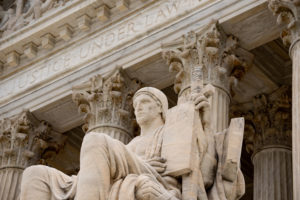What Do U.S. Courts Say About the Use of AI?
An analysis of state and federal court decisions uncovers standards to guide governmental use of artificial intelligence.
Legislators as Defendants but Not as Plaintiffs
The Supreme Court increased potential intervening defendants when it implicitly protected voter ID laws.
Federal Court Involvement in Supervised Release
Study indicates a vital judicial role in overseeing defendants’ reentry following prison.
Regulatory Recognition of Native Histories
Judicial disregard of Native Nations’ ethnohistory frustrates the purpose of federal law protecting Native remains.
FTC v. Qualcomm, Antitrust, and Intellectual Property
A significant federal court decision expands on the relationship between antitrust and intellectual property law.
Should the Federal Government Allow States to Require Medicaid Recipients to Work?
A federal judge strikes a blow to two states’ Medicaid work requirements.
Is the Fiduciary Rule Dead?
The fiduciary rule may still be enforceable because of the Labor Department’s failure to act.
Amusement Park Accommodations for the Disabled
Commentator argues that amusement parks can do more to expand access to disabled individuals.
Changes to Universities’ Sexual Assault Tribunals May Be Here to Stay
Education Department is planning to make significant reforms to Title IX regulations.
New Front in the Labor War Between Uber and Its Drivers
Rideshare drivers in Philadelphia take their challenge for employee status to the Third Circuit.
Crossing the Regulatory Divide to Enhance Societal Well-Being
Requiring EPA cost-benefit analysis could ensure that regulations do more good than harm.
Nuclear Energy at the Forefront of States’ Clean Energy Policies
Expert argues that courts should not strike down state programs that subsidize nuclear power plants.












